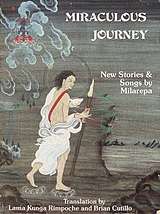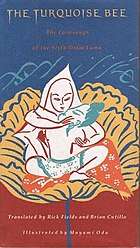Brian Cutillo
Brian A. Cutillo (1945–2006) was a scholar and translator in the field of Tibetan Buddhism. He was also an accomplished neuro-cognitive scientist, musician, anthropologist and textile weaver.
Studies at MIT
Cutillo was a graduate of the Massachusetts Institute of Technology majoring in physics (1967).
While at MIT, Brian wrote the music for An Evening of One Act Plays presented October 14–15, 1966:[1]
- At the Hawk’s Well -- By William Butler Yeats; Directed by Ralph Sawyer ’67; Music - Brian Cutillo ’67
Brian provided the cultural background and translations for the recording "The Music of Tibet". The recordings were made by Prof. Huston Smith, then Professor of Philosophy at MIT, in 1964. Dr. Smith provided an interpretation. The recording was reviewed in the journal Ethnomusicology in 1972.[2]
Studies with Geshe Wangyal
Brian Cutillo was introduced to Ngawang Wangyal while a student at MIT. He became one of his earliest American students. Ngawang Wangyal wrote the book The Door of Liberation published by Maurice Girodias Associates, Inc., (1973). Among the Acknowledgments in the original edition are:
In connection with the Buddhist Studies Institute, I must acknowledge the efforts of two of my students, Dr. Christopher George and Dr. Robert Thurman, who are now coordinating the activities of the Institute.
Also, I appreciate very much Dr. Jeffrey Hopkins' many years of dedicated service to the Lamaist Buddhist Monastery of America.
And last but not least, I extend my thanks to my students: to Brian Cutillo, for his devotion and effort in our work of translation.[3]
Ngawang Wangyal and Brian Cutillo also translated the Illuminations of Sakya Pandita. From the rear book cover:
Like a blind man finding a jewel
In a heap of garbage.
Through what good fortune
Was this Illumination born in me.[4]
Cutillo writes in the Preface to Illuminations:
The work of translation began in 1970 with a reading of the text by the late Geshe Wangyal to close students at his retreat house in Washington, NJ...In the fall of 1985 I once again turned to the translation, but felt that the manner of presentation was too formal for its intended audience in America. Recalling Geshe Wangyal's exhortation to 'Do it PROPERLY'... Illuminations attempts to (provide) a practical manual of essential Buddhist practices in a clear and direct style. This was also Sakya Pandita's purpose in the thirteenth century, and the book has been translated with his aim in mind.[5]
Milarepa translations
Cutillo's best known work includes two books of Milarepa poems translated with Kunga Rinpoche, Drinking the Mountain Stream and Miraculous Journey.[6]

When starting the Lotsawa publishing company to publish these two collections of beloved songs, against impossible odds, Cutillo was also instrumental in publishing important works by H.V. Guenther (The Creative Vision) and Longchenpa (You Are the Eyes of the World).
The Turquoise Bee

With the late Rick Fields, Cutillo translated The Turquoise Bee. These were the love songs of the 6th Dalai Lama.[7] The book page shows Ume calligraphy by Brian Cutillo and a drawing by Mayumi Oda.
Scholarly Tibetan Buddhism translations
Brian translated scholarly Tibetan Buddhism Abhidharma texts that remained unpublished at his death.
Some of these translations are now being completed for publication under the auspices, among others, of the Infinity Foundation. They were started some 35 years ago in collaboration with Dr. Robert Thurman.
- "...The following texts in rough draft form needing further work for publication in the mid-future: ... Abhidharma-samuccaya by Asanga (Thurman and Cutillo); Samdhinirmocana-sutra (Thurman and Cutillo) ..."[8]
Research in human cognitive neuroscience
Brian Cutillo worked with his MIT classmate, Dr. Alan Gevins,[9] in the early days of the EEG Systems Lab in San Francisco. Cutillo co-authored with Dr. Gevins, and others, numerous scientific research papers including 3 papers published in Science, the Journal of the American Association for the Advancement of Science. Along with a paper from the EEG Systems Lab in Science in 1979, these 3 papers helped usher in the modern era of cognitive neuroscience by reporting advanced computerized methods of measuring the electrical signals in the human brain reflecting fundamental cognitive processes of attention.
- Gevins, A.S., Morgan, N.H., Bressler, S.L., Cutillo, B.A., White, R.M., Illes, J., Greer, D.S., Doyle, J.C. & Zeitlin, G.M. (1987). Human neuroelectric patterns predict performance accuracy. Science, 235, 580-585.
- Gevins, A.S., Schaffer, R.E., Doyle, J.C., Cutillo, B.A., Tannehill, R.L. & Bressler, S.L. (1983). Shadows of thought: Shifting lateralization of human brain electrical patterns during brief visuomotor task. Science, 220, 97-99.
- Gevins, A.S., Doyle, J.C., Cutillo, B.A., Schaffer, R.E., Tannehill, R.S., Ghannam, J.H., Gilcrease, V.A. & Yeager, C.L. (1981). Electrical potentials in human brain during cognition: New method reveals dynamic patterns of correlation. Science, 213, 918-922.
With the Hopi community in Arizona
Cutillo was a key figure, initially as a Tibetan language translator, in the interplay between the Hopi Indian community and Tibetan Buddhist monks who were born in Tibetan speaking regions.
Cutillo's association with the Hopi community is documented in a radio recording with James Koots A Hopi Plea. The recording is available from New Dimensions Media as Program #1613. From the New Dimensions Website review:
- "(James) Koots, designated messenger of the Hopi Elders, tells of the threat to the centuries-old tradition of the Hopi. Modern technology, unwanted government gifts and misdirected aid programs are taking their toll on the Hopi culture. In a personal and poignant way Koots shares the Hopi love of the Earth. He is joined by (Brian) Cutillo, a Buddhist scholar who has befriended the Hopi in their quest to preserve their ancient ways."[10]
Textile endeavors
Brian Cutillo wove textiles on a manual floor loom based on early American heirloom patterns. Many of those weavings, including those in the photographs, are in private collections.
Obituary
Brian Cutillo died January 4, 2006 in Tulare, CA. His obituary (January 10, 2006) in the Tulare Advance-Register read:
- "Brian A. Cutillo, 60, of Tulare died Wednesday, Jan. 4, 2006. He was a scientist and an author. Funeral arrangements..."
References
- One act Plays at MIT: http://web.mit.edu/dramashop/www/archive/1966-67/oneacts.html
- The Music of Tibet: The Tantric Rituals by Huston Smith, Peter Crossley-Holland, Kenneth H. Stevens, Brian Cutillo, Nga Wang Lek Den Review author[s]: Mireille Helffer Ethnomusicology, Vol. 16, No. 1 (Jan., 1972), pp. 152-154
- Ngawang Wangyal (1995). The Door of liberation : essential teachings of the Tibetan Buddhist tradition (Rev. ed.). Boston: Wisdom Publications. ISBN 978-0861710324.
- sa skya paṇḍita kun dga' rgyal mtshan & Thupten Wangyal 1988.
- Sa skya paṇḍita Kun dga' rgyal mtshan & Thupten Wangyal 1988, p. Preface.
- Jetsun Milarepa 2013.
- The Turquoise Bee translated by Rick Fields and Brian Cutillo (HarperSanFrancisco/HarperCollins 1994) ISBN 0-06-250310-3
- Global Renaissance Institute/Tibet House Archived January 31, 2011, at WebCite
- SAM Technology, Inc. Archived January 31, 2011, at WebCite
- New Dimensions Media. A HOPI PLEA, Guest: James Koots Brian Cutillo, Program #1613 Archived January 31, 2011, at WebCite
Bibliography
- Jetsun Milarepa (2013). Drinking the Mountain Stream: Songs of Tibet's Beloved Saint, Milarepa. Wisdom Publications. ISBN 978-0-86171-837-5.
- sa skya paṇḍita kun dga' rgyal mtshan; Thupten Wangyal (1988). Illuminations: A Guide to Essential Buddhist Practices. Lotsawa. ISBN 978-0-932156-05-1.CS1 maint: ref=harv (link)

